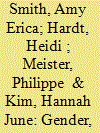|
|
|
Sort Order |
|
|
|
Items / Page
|
|
|
|
|
|
|
| Srl | Item |
| 1 |
ID:
184280


|
|
|
|
|
| Summary/Abstract |
Most research on diversity within political methodology focuses on gender while overlooking racial and ethnic gaps. Our study investigates how race/ethnicity and gender relate to political science PhD students’ methodological self-efficacy, as well as their general academic self-efficacy. By analyzing a survey of 300 students from the top 50 US-based political science PhD programs, we find that race and ethnicity correlate with quantitative self-efficacy: students identifying as Black/African American and as Middle Eastern/North African express lower confidence in their abilities than white students. These gaps persist after accounting for heterogeneity among PhD programs, professional and socioeconomic status, and preferred methodological approach. However, small bivariate gender gaps disappear in multivariate analysis. Furthermore, gaps in quantitative self-efficacy may explain racial/ethnic disparities in students’ broader academic self-efficacy. We argue that the documented patterns likely lead to continued underrepresentation of marginalized groups in the political methodology student body and professoriate.
|
|
|
|
|
|
|
|
|
|
|
|
|
|
|
|
| 2 |
ID:
171286


|
|
|
|
|
| Summary/Abstract |
Numerous studies document female scholars’ underrepresentation in political science publications and citations, yet few examine graduate syllabi. In this study, we assess the impact of instructors’ individual characteristics (i.e., race, gender, and age) on which readings they assign. We use what is—to our knowledge—the largest dataset of graduate readings to date: the GRaduate Assignments DataSet (GRADS), with 75,601 readings from 840 syllabi in 94 US PhD programs. We report several findings. First, overall, instructors infrequently assign female-authored scholarship relative to the rates at which women publish. Second, instructors who are women, people of color, and those from more gender-equal countries assign significantly more female-authored readings than white male instructors and those from less gender-equal countries. Third, among women—but not men—older instructors assign more female-authored work. We suggest that women’s underrepresentation on syllabi may contribute to “the leaky pipeline,” which describes women’s attrition from academic careers.
|
|
|
|
|
|
|
|
|
|
|
|
|
|
|
|
|
|
|
|
|